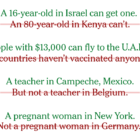Organized Crime Guide
Investigating Arms Trafficking
|
National laws that govern arms dealing are uneven, contradictory, influenced by corrupted leadership, and rife with loopholes. Other barriers to exposing the weapons trade range from maritime and aviation secrecy concealing the transportation of arms; corporate entities that shield dealers and operators; the role of neighboring countries as conduits, and a barter system that allows one illicit commodity, such as ivory, to be exchanged for another.

